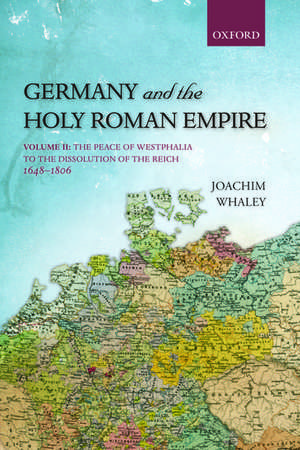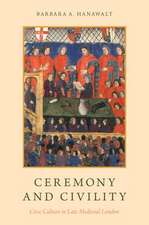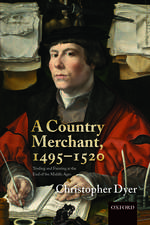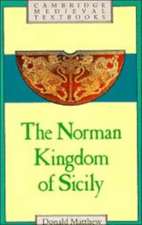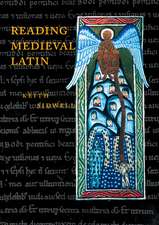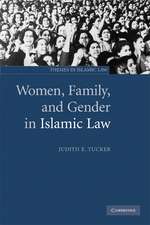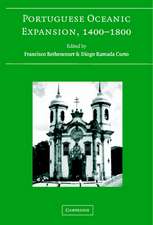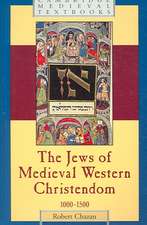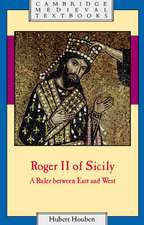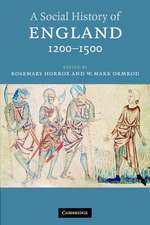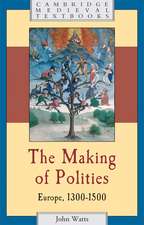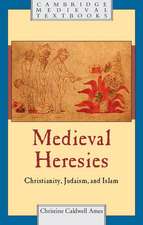Germany and the Holy Roman Empire: Volume II: The Peace of Westphalia to the Dissolution of the Reich, 1648-1806: Oxford History of Early Modern Europe
Autor Joachim Whaleyen Limba Engleză Paperback – 10 oct 2013
| Toate formatele și edițiile | Preț | Express |
|---|---|---|
| Paperback (2) | 363.27 lei 10-16 zile | |
| Oxford University Press – 10 oct 2013 | 363.27 lei 10-16 zile | |
| Oxford University Press – 10 oct 2013 | 363.87 lei 31-37 zile | |
| Hardback (2) | 991.85 lei 31-37 zile | |
| OUP OXFORD – 24 noi 2011 | 991.85 lei 31-37 zile | |
| OUP OXFORD – 24 noi 2011 | 1064.91 lei 31-37 zile |
Preț: 363.87 lei
Preț vechi: 457.70 lei
-21% Nou
Puncte Express: 546
Preț estimativ în valută:
69.63€ • 72.94$ • 57.71£
69.63€ • 72.94$ • 57.71£
Carte tipărită la comandă
Livrare economică 29 martie-04 aprilie
Preluare comenzi: 021 569.72.76
Specificații
ISBN-13: 9780199688838
ISBN-10: 0199688834
Pagini: 784
Ilustrații: 2 black and white maps
Dimensiuni: 155 x 236 x 42 mm
Greutate: 1.1 kg
Editura: Oxford University Press
Colecția OUP Oxford
Seria Oxford History of Early Modern Europe
Locul publicării:Oxford, United Kingdom
ISBN-10: 0199688834
Pagini: 784
Ilustrații: 2 black and white maps
Dimensiuni: 155 x 236 x 42 mm
Greutate: 1.1 kg
Editura: Oxford University Press
Colecția OUP Oxford
Seria Oxford History of Early Modern Europe
Locul publicării:Oxford, United Kingdom
Recenzii
Review from previous edition: Whaley sees the Reich as a continually reforming, diverse but legally ordered polity, rather than some kind of bizarre monstrosity or collective fiction. His two volumes are exceptionally well written and highly nuanced and reflect the latest scholarship. Indeed, they represent a huge personal achievementthey will provide a standard of scholarship against which all future works will be measured
its complexity and sophistication [...the] stupendous breadth and depth of Whaley's knowledge. The two volumes are full of incisive chapters on topics as diverse as economic policies, religious reform movements, court culture ... skilfully crafted and engrossing narrative
superb and authoritative study
Whaley's account is one of the best works on early modern German history. From the first page to the last, it shows how German history can be presented as both a history of Emperor and Empire, and a history of common culture. It will immediately establish itself as a standard guide to its subject
[Whaley's] skilfully crafted and engrossing narrative shows with great lucidity how enduring and successful were the constitutional structures put in place around 1500
the most comprehensive survey of Germany's early modern history ever undertaken, the first book of its kind since the 1950s, and one of the most substantial works of historical scholarship published in the UK in 2011
An enterprise of this magnitude requires a steady hand on the tiller, as the author steers between the rocks of historiographical controversy and the shoals of submerged detail Whaley accomplishes his argosy with poise and style. These two volumes, which will undoubtedly become a first point of reference, are a remarkable achievement of which the author should feel justly proud
His work, though different in emphasis and organisation, stands equal with the major German speaking syntheses today existing such as by Horst Rabe, Karl Otmar von Aretin, Heinz Schilling, or Georg Schmidt. His detailed knowledge of the vast relevant research literature, in German or in any other language, on topics ranging from the later fifteenth to the early nineteenth century is breath-taking. As such, this work is a must-read for all students of Early Modern Germany unless they work on specific issues of social and demographic history. The superior quality of Whaley's synthesis is beyond question. This is a masterpiece that demands close attention and respect.
an account whose methodological reflection, thematic range, and wealth of detail are unparalleled... these two volumes will quickly become standard works... their particular form, combining sections on historiography and methodology, structural history and the history of events, has no counterpart in the German-language historiography.
...successfully combines an experts love of detail with a clear view of the large picture...[It] can be recommended without hesitation as a valuable handbook for history teachers, students and journalists... [and] anyone interested in the historical-political development of Germany in Europe.
a work of impressive scholarship and considerable erudition ... These two volumes put the Empire firmly back into German history. They provide a richly detailed, judiciously balanced discussion of the last three centuries of the Empires existence ... Whaleys history is a must for anyone with a serious interest in early modern Germany.
A full and fresh assessment of more than three hundred years of German history ... the best political and institutional history of the Reich in any language ... Whaley seems to have read and digested everything. For this astonishing achievement alone one must be grateful ... As a general treatment of three centuries of legal and institutional history Whaley's volume will stand as a monument of erudite revisionism that, within its self-imposed limits, could hardly be improved.
These two volumes offer an historical survey of roughly three centuries such as I have never before encountered. Joachim Whaley has produced a masterpiece. He has not overlooked anything at all. The two volumes are perfectly researched and the price ... is more than reasonable. Anyone interested in modern history and in particular the history of Germany must read this work.
a pleasure to read ... Whaley shows how the efforts to create an intellectual and political framework in the pre-constitutional era had lasting effects to the present.
a great achievement that he has introduced the English-speaking public to German history before the twentieth century in such a comprehensive manner and that he shows so decisively how the old national narrative has been revised. The sheer volume of the material that he employs also commands respect.
The new standard work on the period in which people still spoke of "German liberties".
essential reading
Joachim Whaley's magnificent new two-volume study ... sets out precisely wherein the Old Reichs distinctive character lay and enables us to appreciate the reasons why it held the loyalties of so many for so long ... The whole is presented with admirable lucidity, free of jargon ... Whaley's monumental and magisterial study will assuredly quickly become and deservedly long remain a standard authoritative handbook for anyone concerned with the subject.
Joachim Whaley's magnificent book gives readers the best, most persuasive available account in any language of the revisionist case. He turns the old view on its head ... He displays a remarkably wide-ranging knowledge of German culture during the three centuries covered by his book ... This is a bracing book of ideas and arguments, sustained over 125 chapters and almost 1,500 pages. It is both scholarly and very readable.
This monumental study ... rests on an impressive body of knowledge, not least on knowledge of the secondary literature ... the extraordinary readability of the two volumes ... makes this text an enjoyable read for specialists, students and enthusiasts from many different fields.
Whaley negotiates a vast bibliography, which includes the history of institutions, to offer an excellent tool that is both a compass for orienting oneself among the various issues and itself a starting point.
One of the most impressive and helpful scholarly monographs of 2012... In this landmark study, Whaley provides a historical overview in which he evaluates narratives and interpretations, that are revealing about the thinking of the period but also in view of some modern views and theories. Chapter by chapter, he tests the validity of perceptions and the sense of identity Germans began to develop in the 16th century not least in opposition to wider European aspirations and claims. By questioning patterns of established thought Whaley manages time and again to add new insights to the interface of subject areas such as theology, politics, the economy and social issues... His study will be as useful to the established scholar as it is to the novice seeking to understand the influences and concerns that shaped the...Empire.
These two-volumes ... are the fruit of long and thorough research and stand out for their many hundreds of pages of reader-friendly freshness. The external perspective of British scholarship has succeeded in producing a standard work on both German and European history.
Joachim Whaley crowns a long generations work of demystifying the empires history with these two large, learned, and impressive volumes.
Whaleys two volumes mark an immense accomplishment and should be read by any scholar working on the early modern Empire or early modern politics in general. They represent the most comprehensive history of the Empire available in English and are sure to generate debate for decades to come.
a massive and exceptionally successful project that offers a comprehensive view of the Holy Roman Empire ... From the point of view of Austrian history, the author is constantly concerned to reflect critically on the relationship of the [Habsburgs'] German hereditary lands, as well as Hungary and Bohemia to the Empire. The volume is encyclopaedic in scope ... the author demonstrates great breadth and expertise in pursuing his themes of political, cultural, constitutional and social history ... In view of its balanced approach and profundity the volume will occupy an unchallenged place in the libraries of scholars next to the work of Aretin and the major handbooks of German and European history ... This work is also exceptionally well written and it represents an awesome achievement on the part of the author
a recognised authority in the field stupendous and enviable knowledge of the scholarly literature [offers] a counterpoint to the decline narratives [of the empire] that still dominate [German historiography]
There is no similar comprehensive and multi-perspectival account [of early modern German history] ... the publication of these volumes is an event for German historians too ... With its encyclopaedic aspiration, the mass of information he offers concerning political, legal, religious-intellectual, administrative, educational and economic developments, as well as the numerous perceptive judgements which correct previous research, Whaley has produced a standard work on the history of the early modern Old Reich, which stands on its own in the international scholarship on this subject ... He has produced a thoroughly scholarly and intelligent work that combines a wealth of information with an ability to formulate original arguments and revise received scholarly opinions.
Joachim Whaley's two volumes on the Holy Roman Empire constitute what is undoubtedly the best work on the topic currently available on the European market ... Whaley surpasses all [others] ... He thus overcomes the prevalent tendency of writing the history of the Empire in separate political, constitutional, religious and economic terms ... he displays an astonishing eye for detail ... No other piece of scholarship can match the attention to detail paid to such a wide variety of different aspects of the history of the Holy Roman Empire as can be found in Whaley's magnum opus. Whaley stands out, as his predecessors in writing the history of the Empire had primarily concentrated on political history alone.
its complexity and sophistication [...the] stupendous breadth and depth of Whaley's knowledge. The two volumes are full of incisive chapters on topics as diverse as economic policies, religious reform movements, court culture ... skilfully crafted and engrossing narrative
superb and authoritative study
Whaley's account is one of the best works on early modern German history. From the first page to the last, it shows how German history can be presented as both a history of Emperor and Empire, and a history of common culture. It will immediately establish itself as a standard guide to its subject
[Whaley's] skilfully crafted and engrossing narrative shows with great lucidity how enduring and successful were the constitutional structures put in place around 1500
the most comprehensive survey of Germany's early modern history ever undertaken, the first book of its kind since the 1950s, and one of the most substantial works of historical scholarship published in the UK in 2011
An enterprise of this magnitude requires a steady hand on the tiller, as the author steers between the rocks of historiographical controversy and the shoals of submerged detail Whaley accomplishes his argosy with poise and style. These two volumes, which will undoubtedly become a first point of reference, are a remarkable achievement of which the author should feel justly proud
His work, though different in emphasis and organisation, stands equal with the major German speaking syntheses today existing such as by Horst Rabe, Karl Otmar von Aretin, Heinz Schilling, or Georg Schmidt. His detailed knowledge of the vast relevant research literature, in German or in any other language, on topics ranging from the later fifteenth to the early nineteenth century is breath-taking. As such, this work is a must-read for all students of Early Modern Germany unless they work on specific issues of social and demographic history. The superior quality of Whaley's synthesis is beyond question. This is a masterpiece that demands close attention and respect.
an account whose methodological reflection, thematic range, and wealth of detail are unparalleled... these two volumes will quickly become standard works... their particular form, combining sections on historiography and methodology, structural history and the history of events, has no counterpart in the German-language historiography.
...successfully combines an experts love of detail with a clear view of the large picture...[It] can be recommended without hesitation as a valuable handbook for history teachers, students and journalists... [and] anyone interested in the historical-political development of Germany in Europe.
a work of impressive scholarship and considerable erudition ... These two volumes put the Empire firmly back into German history. They provide a richly detailed, judiciously balanced discussion of the last three centuries of the Empires existence ... Whaleys history is a must for anyone with a serious interest in early modern Germany.
A full and fresh assessment of more than three hundred years of German history ... the best political and institutional history of the Reich in any language ... Whaley seems to have read and digested everything. For this astonishing achievement alone one must be grateful ... As a general treatment of three centuries of legal and institutional history Whaley's volume will stand as a monument of erudite revisionism that, within its self-imposed limits, could hardly be improved.
These two volumes offer an historical survey of roughly three centuries such as I have never before encountered. Joachim Whaley has produced a masterpiece. He has not overlooked anything at all. The two volumes are perfectly researched and the price ... is more than reasonable. Anyone interested in modern history and in particular the history of Germany must read this work.
a pleasure to read ... Whaley shows how the efforts to create an intellectual and political framework in the pre-constitutional era had lasting effects to the present.
a great achievement that he has introduced the English-speaking public to German history before the twentieth century in such a comprehensive manner and that he shows so decisively how the old national narrative has been revised. The sheer volume of the material that he employs also commands respect.
The new standard work on the period in which people still spoke of "German liberties".
essential reading
Joachim Whaley's magnificent new two-volume study ... sets out precisely wherein the Old Reichs distinctive character lay and enables us to appreciate the reasons why it held the loyalties of so many for so long ... The whole is presented with admirable lucidity, free of jargon ... Whaley's monumental and magisterial study will assuredly quickly become and deservedly long remain a standard authoritative handbook for anyone concerned with the subject.
Joachim Whaley's magnificent book gives readers the best, most persuasive available account in any language of the revisionist case. He turns the old view on its head ... He displays a remarkably wide-ranging knowledge of German culture during the three centuries covered by his book ... This is a bracing book of ideas and arguments, sustained over 125 chapters and almost 1,500 pages. It is both scholarly and very readable.
This monumental study ... rests on an impressive body of knowledge, not least on knowledge of the secondary literature ... the extraordinary readability of the two volumes ... makes this text an enjoyable read for specialists, students and enthusiasts from many different fields.
Whaley negotiates a vast bibliography, which includes the history of institutions, to offer an excellent tool that is both a compass for orienting oneself among the various issues and itself a starting point.
One of the most impressive and helpful scholarly monographs of 2012... In this landmark study, Whaley provides a historical overview in which he evaluates narratives and interpretations, that are revealing about the thinking of the period but also in view of some modern views and theories. Chapter by chapter, he tests the validity of perceptions and the sense of identity Germans began to develop in the 16th century not least in opposition to wider European aspirations and claims. By questioning patterns of established thought Whaley manages time and again to add new insights to the interface of subject areas such as theology, politics, the economy and social issues... His study will be as useful to the established scholar as it is to the novice seeking to understand the influences and concerns that shaped the...Empire.
These two-volumes ... are the fruit of long and thorough research and stand out for their many hundreds of pages of reader-friendly freshness. The external perspective of British scholarship has succeeded in producing a standard work on both German and European history.
Joachim Whaley crowns a long generations work of demystifying the empires history with these two large, learned, and impressive volumes.
Whaleys two volumes mark an immense accomplishment and should be read by any scholar working on the early modern Empire or early modern politics in general. They represent the most comprehensive history of the Empire available in English and are sure to generate debate for decades to come.
a massive and exceptionally successful project that offers a comprehensive view of the Holy Roman Empire ... From the point of view of Austrian history, the author is constantly concerned to reflect critically on the relationship of the [Habsburgs'] German hereditary lands, as well as Hungary and Bohemia to the Empire. The volume is encyclopaedic in scope ... the author demonstrates great breadth and expertise in pursuing his themes of political, cultural, constitutional and social history ... In view of its balanced approach and profundity the volume will occupy an unchallenged place in the libraries of scholars next to the work of Aretin and the major handbooks of German and European history ... This work is also exceptionally well written and it represents an awesome achievement on the part of the author
a recognised authority in the field stupendous and enviable knowledge of the scholarly literature [offers] a counterpoint to the decline narratives [of the empire] that still dominate [German historiography]
There is no similar comprehensive and multi-perspectival account [of early modern German history] ... the publication of these volumes is an event for German historians too ... With its encyclopaedic aspiration, the mass of information he offers concerning political, legal, religious-intellectual, administrative, educational and economic developments, as well as the numerous perceptive judgements which correct previous research, Whaley has produced a standard work on the history of the early modern Old Reich, which stands on its own in the international scholarship on this subject ... He has produced a thoroughly scholarly and intelligent work that combines a wealth of information with an ability to formulate original arguments and revise received scholarly opinions.
Joachim Whaley's two volumes on the Holy Roman Empire constitute what is undoubtedly the best work on the topic currently available on the European market ... Whaley surpasses all [others] ... He thus overcomes the prevalent tendency of writing the history of the Empire in separate political, constitutional, religious and economic terms ... he displays an astonishing eye for detail ... No other piece of scholarship can match the attention to detail paid to such a wide variety of different aspects of the history of the Holy Roman Empire as can be found in Whaley's magnum opus. Whaley stands out, as his predecessors in writing the history of the Empire had primarily concentrated on political history alone.
Notă biografică
Joachim Whaley read History at Christ's College Cambridge. He held Fellowships in History at Christ's College and Robinson College before becoming a Lecturer in German in the Faculty of Modern and Medieval Languages at Cambridge, where he teaches German history, thought, and language. He is the author of Religious Toleration and Social Change in Hamburg 1529-1819 and of numerous articles on early modern and modern German history. He was elected a Fellow of the Royal Historical Society in 1984, and Fellow of the British Academy in 2015.
